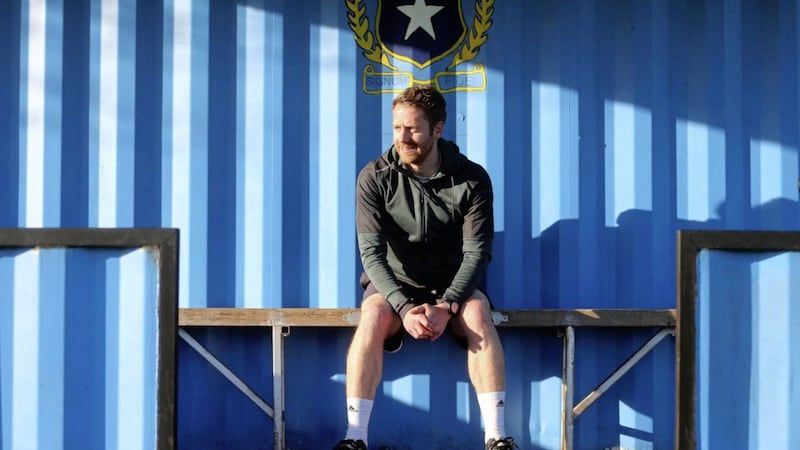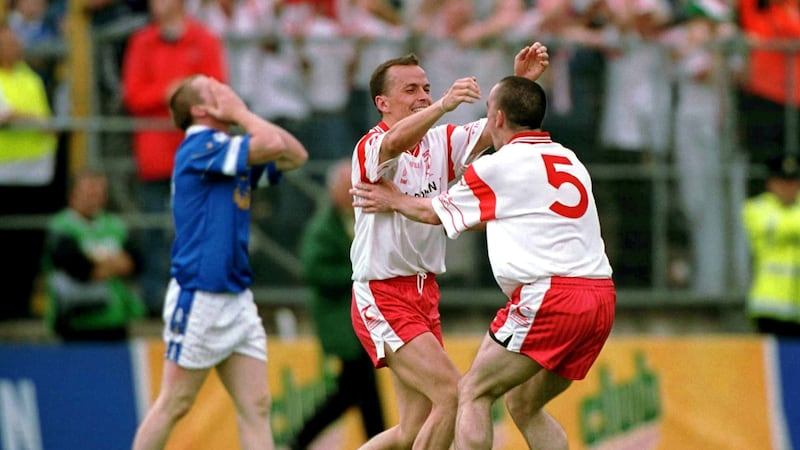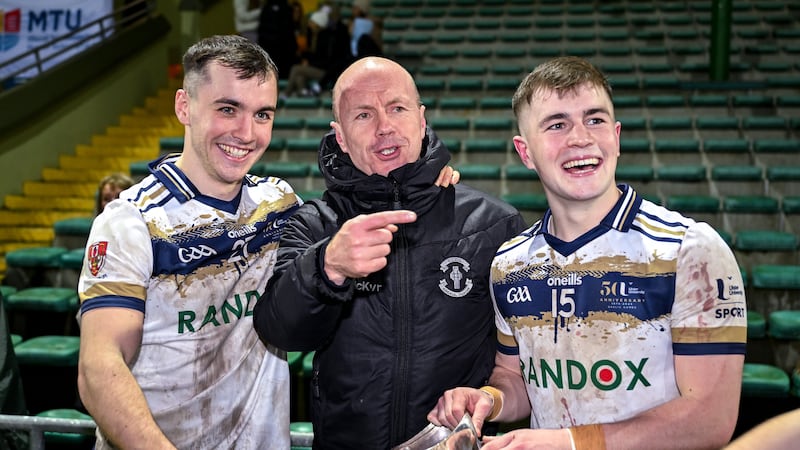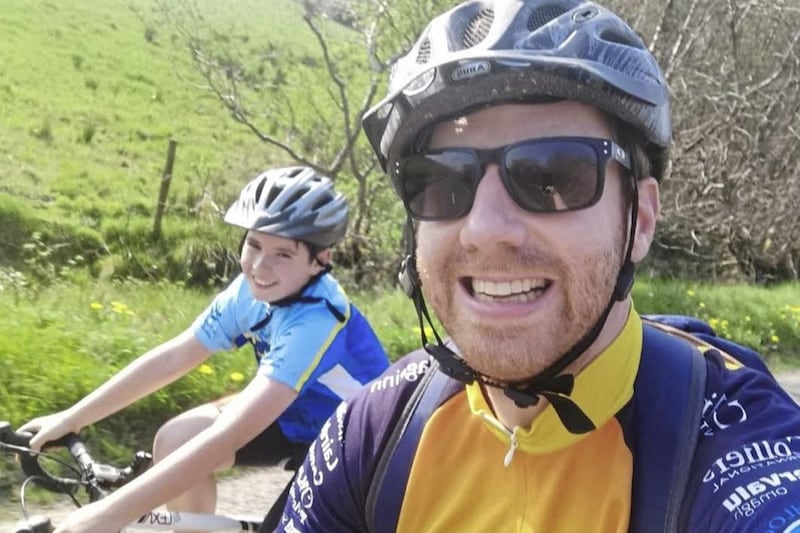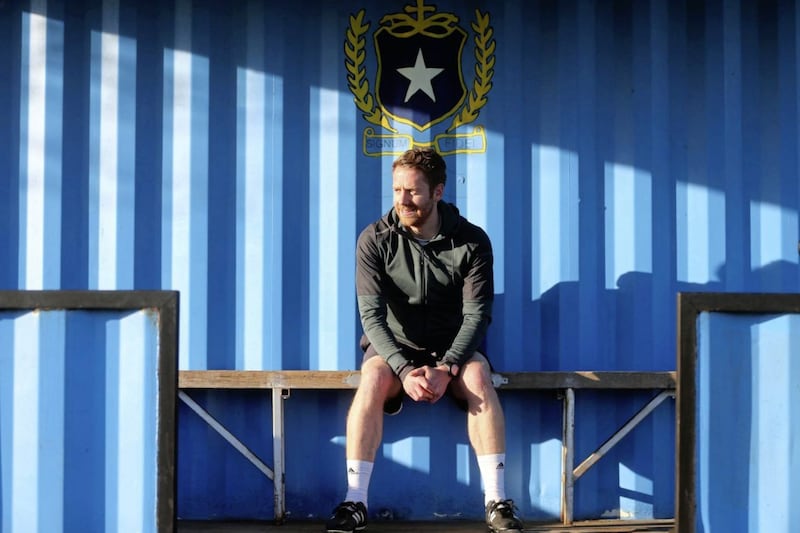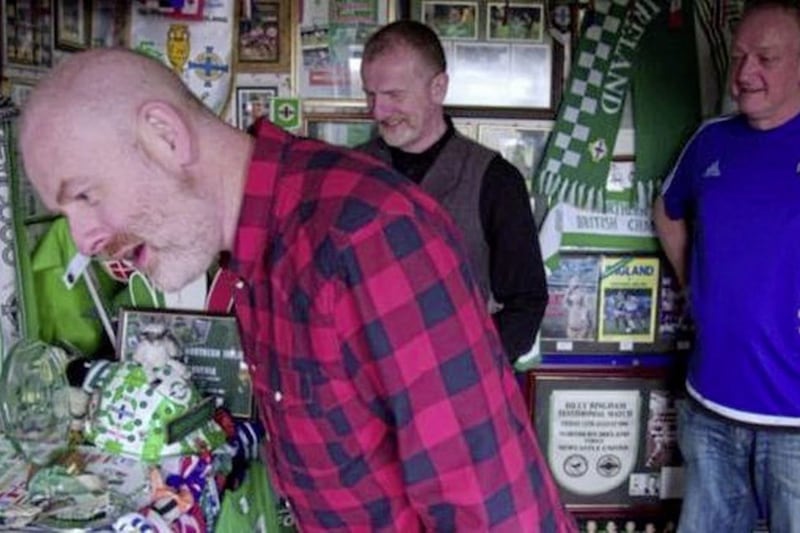IT’S funny how life works out sometimes. One day you’re chasing a jet-heeled whippersnapper from Donaghmore around a Gaelic football field in Tyrone, trying to figure out a way – any way – to prevent his lightning pace inflicting maximum damage.
The guts of 20 years pass in what feels like the blink of an eye and here you are, keeping that same young lad in tune and helping prolong an international soccer career that has brought some serious highs, with the hope of more to come.
GAA connections within the Northern Ireland soccer set-up can be rare enough, that fate has brought thirty-somethings Gary Wallace and Niall McGinn back together a generation on just one of the quirks of an atypical sporting journey.
Last summer Wallace was drafted into Ian Baraclough’s backroom team as a strength and conditioning coach having previously worked with the North’s U21, U19 and U17 sides as well as the Club NI youth set-up.
And memories of bygone days weren’t long coming back when he hooked up with the senior squad for the first time.
“I would probably have marked Niall a few times when we were coming onto the scene back in the day,” he smiles, “he was a lot quicker than me then and he’s still a lot quicker than me now.”
Yet while McGinn’s career has taken him to Celtic, Aberdeen and even a short stint in South Korea, not to mention 63 international caps and counting, he didn’t manage to land a Tyrone senior football championship medal – never mind two.
Wallace was only starting out on his senior career in 2003 when Killyclogher kickstarted their centenary celebrations with a maiden O’Neill Cup triumph. The 18-year-old didn’t feature in the final win over defending champions Errigal Ciaran but had played his part in the early stages of an unforgettable run.
However, by the time the St Mary’s would get their hands on that coveted prize again 16 years down the track, Wallace was one of the grizzled veterans on a team reinvigorated by emerging Tyrone stars Mark Bradley and brothers Tiernan and Conall McCann.
His own game had evolved too from the relative abandon of the Noughties, Wallace now relishing the man-marking jobs and the physical challenge of curtailing the opponent’s main threat.
“You have to be 100 per cent focused physically and mentally to play that role but I loved it because I was doing a job for the team – if I stop their best player playing then that reduces the chances of that team winning.
“Through the years me and Mattie [Donnelly] had a couple of battles, Niall Sludden was always good, Petey Harte was lightning quick, [Stephen] McNally from Coalisland… I had the odd wee tussle with ‘Ricey’ [Ryan McMenamin] when he was coming near the end of it.
“I’ve great respect for them all, all brilliant people too away from football. There might have been a bit of the dark arts on the pitch but you left it there. I’ve the utmost respect for anybody who puts in that time and effort – even though you want to go out, you want to win and be the best, these guys are sacrificing so much to play at a high level so you have to respect them all, especially in the likes of Tyrone where those marginal gains are so important.
“I was very fortunate growing up, being part of a successful youth team coming through. We probably missed a few opportunities at senior but we ended up winning two leagues and two championships. In Tyrone that’s a decent enough collection.
“Since then though the level has just gone up and up. You have to be doing your extra strength and conditioning, your recovery, your nutrition, everything has to be on point to be successful. That’s probably why I couldn’t give the level of commitment any more…”
Wallace first hung up his boots after a 2018 campaign that ended in disappointment, Coalisland gaining revenge for that replay final defeat two years earlier by taking the spoils in impressive fashion.
After sitting out the following year, the shorter season lured him back in for one last shot in 2020. He’s glad he did, if only because it left him in no doubt that the time had come to walk away for good.
Wear and tear on the body may have taken a toll but striking a balance was becoming more of a challenge. Wallace has a young family at home, while the coaching career that began at 16 at an IFA centre in Omagh had ramped up since starting his business, Core NI, which aims to promote healthy lifestyles and improve sporting performance across the spectrum.
In the middle of the all that he had also discovered ultra-marathon running, and the buzz football had once given him.
“I signed up to do one in Connemara in 2019, the year I had stepped away from football. Before that I had never ran more than 10k, I’d never done a marathon but I knew I could do one. I wasn’t going to smash any time but I knew I could get through it; for me it was just a mindset thing.
“My first marathon was one Saturday morning, snow and everything was coming down, me and a mate were planning to go out and do decent miles but we just ended up running the marathon distance for that training session and slowly built it up from there.
“It’s funny how your mind and your body works. At the start if someone had told me I could go out and run eight miles I’d have laughed, but we just built it up and in the end you were running eight miles as a recovery run.
“I didn’t go down to Connemara with a time in my head, I went down to complete it and enjoy it, which I did – although at one point I thought I was taking a mini heart attack. I had to pull into the wee cubicle, I might have taken too much of the energy gels and it caused a bit of a spasm with the sugar but it turned out okay.
“I love a challenge, always have. It’s been a year of trying new things, being outdoors, meeting new people, doing something different.”
Next on the radar is an Ironman event in Cork in mid-August. And even if Covid should play havoc with the scheduling, contingency plans are already in place.
“We live in uncertain times but if it doesn’t happen we’ll just head off around Donegal direction and do one ourselves.”
There are bigger fish to fry in the meantime, though.
Around his own business commitments, Wallace is currently involved with Antrim contenders St Gall’s under boss Paddy Murray as they bid to wrestle back control of the county from Cargin.
“It’s great to be around that community mentality.
“There’s fantastic people around the club, Michael Culbert, Paddy McShane, Collie McMaster, Paul Walsh, Fay Devlin, Ciaran Stitt, guys like that all put in so much effort to help develop the whole ethos behind St Gall’s.”
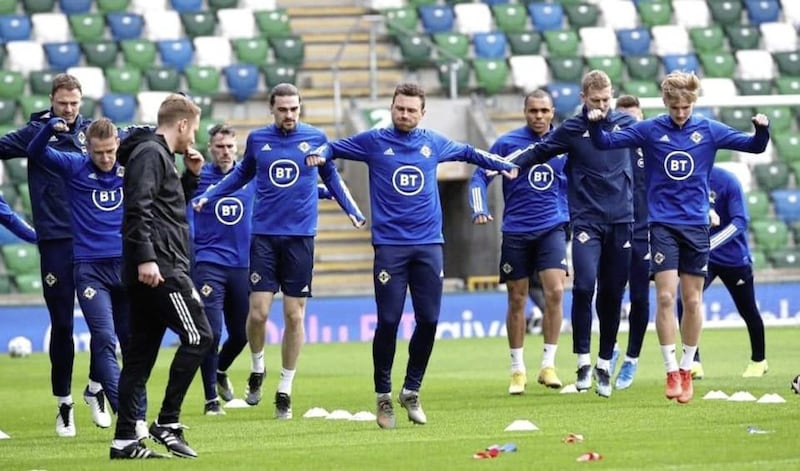
Northern Ireland, meanwhile, have summer friendlies lined up against Turkey and Ukraine ahead of September’s crucial World Cup qualifying clash with Lithuania. Nine months after being brought onboard by Baraclough, it still feels somewhat surreal.
“It was a huge shock to be asked because at the time Stephen Frail, the 17 and 19 manager, had taken up a full-time role and we had a fantastic team.
“I enjoyed that and had come through with a lot of the players all the way up, and always felt my role was more about helping put those players back in their club so they’re in a better place when it comes to challenging for contracts, that sort of thing.
“It was a developmental role, but when the call came from Ian I jumped at the chance. You’re now working with elite senior players and it’s a totally different approach – you’ve some players at Premier League level, others maybe play in the Irish League and you’re trying to implement stuff where these guys know exactly what they’re doing.
“You only have access to them for short periods so you’re just asking yourself what you can do to help the performance of the team. When I was with the underage it was just me along with a physio and a doctor but in the senior set-up there’s Ricky McCann, lead sport scientist who’s been there for years, a full medical team… it’s a bit of a difference.”
Stuart Dallas is one of those who has made the journey from Irish League to Premier League, the former Crusaders winger’s relentless, all-action style seeing him emerge as one of the stars of Marcelo Bielsa’s entertaining Leeds side.
And, having had the opportunity to work with Dallas at close quarters, Wallace couldn’t be more impressed with his fellow Tyrone man.
“I think he’s got a third lung and a spare heart somewhere.
“First and foremost he’s a great lad, they have a great group and they’re all very welcoming to the younger players who come in. Stuart only knows one way to train, it’s as simple as that.
“He’s built a level of robustness that he can withstand high intensity loads, his GPS scores are always through the roof. It’s the only way he knows how to play, and that’s the way it was even going back to his time at Crusaders, he would’ve just constantly kept bombing up and down.
“He plays with pure passion, pure drive, pure desire, add that all together with his genetics, the way that he’s built, he’s so robust. That’s the best way to describe him. A phenomenal athlete.”
The attention to detail and the training delivered at that level were an eye-opener. However, the strides made on the fields where he plied his trade for so many years have also become a subject of constant debate in recent times.
Just last month strength and conditioning coach Mike McGurn said inter-county players are over-trained – even claiming many are doing more training than the world renowned All Blacks rugby team, with whom he worked in 2008.
Wallace, though, believes lessons are finally being learned and set-ups at club and county level are “getting smarter”.
“Thankfully, I think that is the case. Some clubs and people are investing in their own education of the physiology of their sport, the training loads and game loads.
“We’re very fortunate with the guys in St Gall’s, especially being a dual club, we are looking alongside the hurling manager to see what nights are available and then we’re reducing our training load. On nights we just look at technical/tactical stuff, we reduce the load in terms of our running and if we have the opportunity, we get it in smartly.
“There was always this thing in Gaelic that you have to be working harder than any other team, your hands should be on your knees, you should be puking at the side of the pitch. Thankfully now, the higher you go up in each county the better that training gets.
“If you look at the likes of Dublin, these guys are primed athletes. They get lifted at training, get their meals prepared for them, they don’t have to worry about getting up early to get onto a site. We have to look at where these players are coming from - have they got a new child in the house? Are they tired, are they able to train?
“You’re trying to get away from that mentality of ‘och you’ll be alright, come on ahead’ to showing a bit of empathy and a bit of smarts because if we want to succeed and win, the more people you have available the better.
“These guys are classified as professional athletes but really they’re amateurs who have all the stresses that you and I have to contend with. That plays a part in increasing the risk of injury, how hard they can train, how quickly they can recover. The good thing is we’re getting to a stage where we do have to be more mindful and more aware of all that.
“You’ll hear the odd horror story about teams having to run 10ks around pitches but I do believe it’s going in the right direction.”
